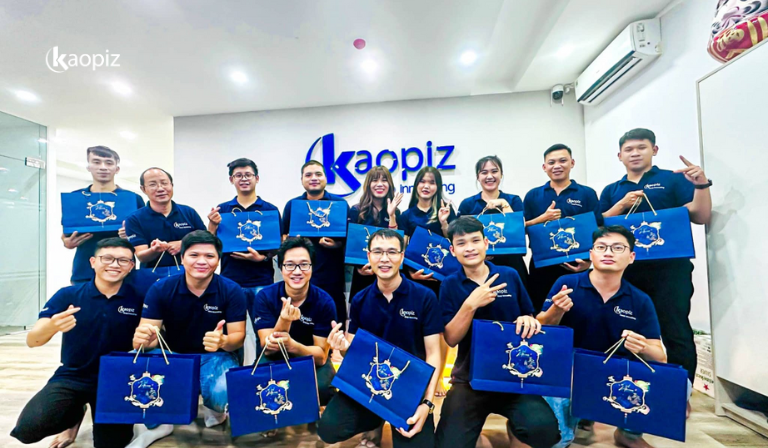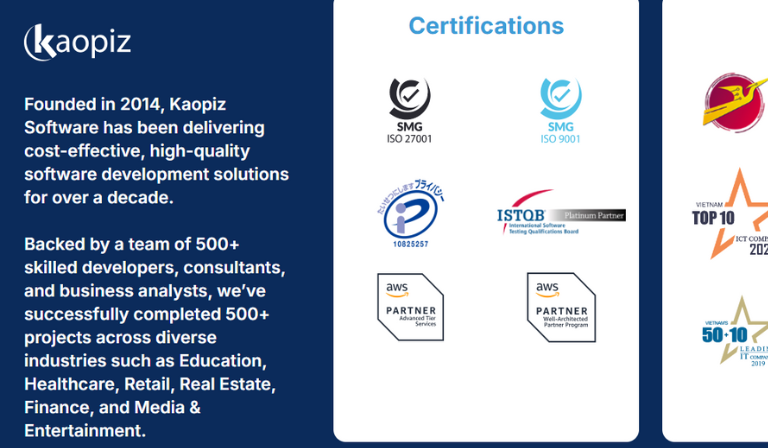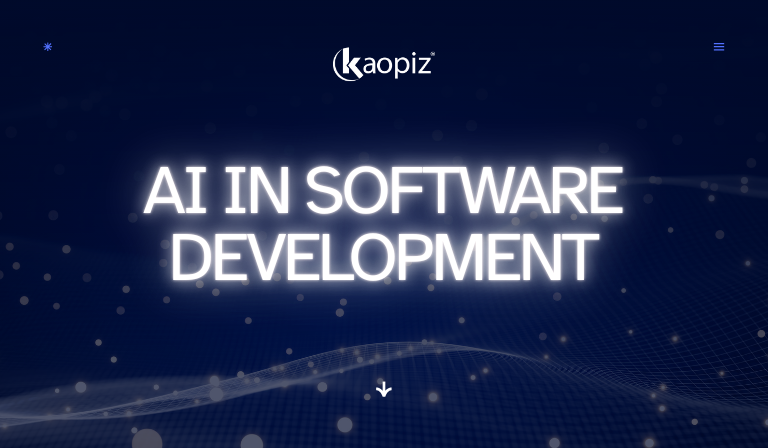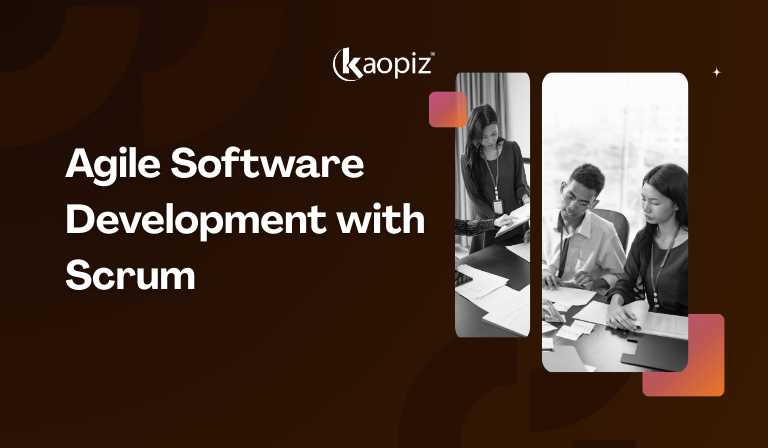Offshore Software Outsourcing – A Strategic Guide for Modern Businesses
As technology evolves rapidly, businesses are under constant pressure to innovate, scale, and deliver faster than ever. Offshore software outsourcing has become a strategic approach to achieve these goals — enabling companies to access global talent, reduce costs, and accelerate development.
In this blog, we explore what offshore software outsourcing is, why it matters, the best practices for success, and why destinations like Vietnam — with trusted partners such as Kaopiz — are becoming top choices for global enterprises.
Table of Contents
- What Is Offshore Software Outsourcing?
- Why Businesses Choose Offshore Software Outsourcing
- Common Offshore Outsourcing Models
- Challenges in Offshore Software Outsourcing
- Best Practices for Successful Offshore Collaboration
- How to Choose the Right Offshore Software Outsourcing Partner
- Why Vietnam Is a Strategic Destination for IT Outsourcing
- Why Choose Kaopiz for Offshore Software Outsourcing
- Offshore Software Outsourcing Trends in 2025 and Beyond
- Conclusion
- FAQs
What Is Offshore Software Outsourcing?
Offshore software outsourcing is the practice of hiring a software development team in another country to build, maintain, or support digital solutions. Instead of managing in-house development, businesses partner with offshore vendors to access skilled talent, advanced technologies, and lower costs.

Unlike onshore (same country) or nearshore (neighboring region) outsourcing, offshore outsourcing involves working across greater distances and time zones — offering broader expertise and cost advantages.
In essence, it’s a strategic way for companies to accelerate development, scale efficiently, and stay competitive in a global digital landscape.
Why Businesses Choose Offshore Software Outsourcing
In today’s competitive digital economy, companies are increasingly turning to offshore software outsourcing to accelerate innovation, optimize costs, and access specialized expertise. Below are the key reasons why this approach has become a strategic choice for global enterprises:
- Access to Global Talent: Offshore outsourcing connects businesses with skilled developers and IT professionals worldwide. Companies can easily find experts in areas like AI, cloud computing, and mobile development that may be scarce or expensive locally.
- Cost Efficiency: Partnering with offshore teams helps reduce expenses related to salaries, infrastructure, and recruitment. This allows businesses to deliver high-quality software while redirecting savings toward innovation or business expansion.
- Faster Time-to-Market: With development teams working across time zones, offshore outsourcing enables 24/7 productivity. Continuous collaboration speeds up project delivery and ensures faster product launches.
- Scalability and Flexibility: Businesses can quickly scale their offshore teams up or down based on project needs. This flexibility supports both short-term initiatives and long-term growth without long hiring cycles.
- Focus on Core Competencies: By delegating software development to offshore experts, organizations can focus internal resources on strategic priorities such as product innovation, customer engagement, and business development.
In essence, offshore software outsourcing empowers companies to combine global expertise, cost savings, and agility – turning collaboration into a driver of long-term success.
Common Offshore Outsourcing Models
When it comes to offshore software outsourcing, businesses can choose from several collaboration models depending on their goals, budget, and level of control. Each model offers different advantages in terms of flexibility, management, and scalability.
- Dedicated Development Team: A full-time offshore team works exclusively on your projects, functioning as an extension of your in-house staff. This model is ideal for long-term partnerships where consistent collaboration, product knowledge, and agility are essential.
- Project-Based Outsourcing: The offshore vendor takes full responsibility for a specific project — from planning to delivery — based on agreed requirements, scope, and deadlines. It’s best suited for companies with well-defined needs or one-time projects.
- Staff Augmentation: This model allows you to integrate offshore developers or specialists into your existing team to fill skill gaps or boost capacity. You retain project control while benefiting from additional expertise and flexibility.
- Managed Services Model: In this setup, the vendor handles the complete IT function or product lifecycle — from development and testing to maintenance and support. It’s a hands-off approach for clients seeking end-to-end management and reliability.
Choosing the right outsourcing model depends on your project’s complexity, budget, and desired level of involvement. The most successful collaborations often combine strategic alignment with clear communication between in-house and offshore teams.
Challenges in Offshore Software Outsourcing
While offshore software outsourcing offers numerous advantages—such as cost savings, access to global talent, and faster delivery—it also comes with challenges that businesses must manage carefully to ensure success. Understanding these obstacles early helps companies build stronger, more transparent partnerships with offshore teams.

- Communication and Time Zone Differences: Working across different time zones can make coordination and real-time communication difficult. Without structured communication channels and overlapping work hours, misunderstandings or project delays can occur.
- Cultural and Language Barriers: Differences in language, work culture, and communication styles may affect collaboration and team dynamics. Building mutual understanding and setting clear expectations are key to overcoming these barriers.
- Quality Assurance and Project Control: Maintaining consistent quality and visibility can be challenging when development happens remotely. Regular updates, progress tracking, and well-defined KPIs help ensure the project stays on course.
- Data Security and IP Protection: Sharing sensitive data with an external vendor raises concerns about security and confidentiality. It’s crucial to work with partners that follow strict compliance standards, such as ISO 27001 and GDPR, and have strong data protection measures in place.
- Alignment of Goals and Expectations: Misaligned priorities or unclear requirements can lead to project scope creep or dissatisfaction. Establishing transparent goals, deliverables, and review processes helps keep all parties aligned.
Addressing these challenges requires proactive management, effective communication, and collaboration built on trust. With the right approach, businesses can turn these potential risks into opportunities for stronger global partnerships and long-term success.
Best Practices for Successful Offshore Collaboration
To fully realize the benefits of offshore software outsourcing, businesses must go beyond hiring the right team—they need to establish effective collaboration practices. Strong communication, shared goals, and well-defined processes are the foundation of a successful offshore partnership.
Here are some proven best practices:
- Set Clear Goals and Expectations: Start every project with a clear understanding of objectives, scope, and deliverables. Document key milestones, deadlines, and success metrics to ensure both parties are aligned from day one.
- Establish Transparent Communication: Use reliable collaboration tools (like Slack, Jira, or Microsoft Teams) and schedule regular check-ins to maintain visibility. Overlapping working hours help improve responsiveness and foster stronger team connections.
- Adopt Agile and DevOps Methodologies: Agile frameworks enable flexibility, continuous feedback, and faster iterations. Combined with DevOps practices, they ensure seamless integration between development and operations teams, leading to higher-quality outcomes.
- Prioritize Security and Compliance: Implement strict data protection measures and ensure your partner complies with global standards such as ISO 27001 or GDPR. Secure file-sharing systems and access controls help safeguard sensitive information.
- Encourage Cultural Alignment and Team Building: Recognize cultural differences and build a collaborative environment through open communication and respect. Virtual team-building activities and cross-cultural training can strengthen long-term relationships.
- Monitor Progress and Performance Regularly: Track progress with measurable KPIs, sprint reviews, and project dashboards. Regular assessments allow quick course corrections and maintain project momentum.
- Build Long-Term Partnerships: The best results come from treating offshore outsourcing as a long-term collaboration rather than a one-time transaction. Trust and mutual understanding lead to greater efficiency, innovation, and shared success.
By following these best practices, companies can bridge distance and cultural gaps, creating a partnership that delivers transparency, productivity, and innovation in every project.
How to Choose the Right Offshore Software Outsourcing Partner
Selecting the right offshore software outsourcing partner is one of the most critical decisions for any organization. Here are key factors to consider:
- Technical Expertise and Industry Experience: Assess the vendor’s proficiency in relevant technologies such as web, mobile, cloud, AI, or DevOps. Experience in your specific industry—like finance, healthcare, or e-commerce—ensures they understand your business needs and compliance requirements.
- Proven Track Record and Portfolio: Review case studies, testimonials, and project success stories. A strong portfolio reflects the vendor’s ability to deliver consistent results, manage complex projects, and maintain quality across different domains.
- Communication and Collaboration Style: Effective communication is vital in offshore partnerships. Choose a vendor that values transparency, provides regular updates, and is comfortable using collaboration tools that align with your workflow.
- Project Management and Methodology: Ensure the partner follows structured frameworks such as Agile or Scrum for iterative development and continuous improvement. Strong project management practices reduce risks and improve delivery timelines.
- Data Security and Compliance Standards: Security should be non-negotiable. Verify that the partner complies with global standards like ISO 27001, GDPR, or local data protection laws. Clear policies on IP rights and confidentiality are essential.
- Cultural and Time Zone Compatibility: A good cultural fit fosters smoother communication and collaboration. Also, consider time zone overlap to enable real-time discussions and faster decision-making.
- Scalability and Flexibility: The ideal partner should offer flexible engagement models and be able to scale resources quickly as your project evolves or your business grows.
- Transparent Pricing and Long-Term Value: Compare pricing structures but focus on overall value rather than just cost. A trustworthy partner will provide transparent estimates and focus on delivering sustainable results.
Why Vietnam Is a Strategic Destination for IT Outsourcing
Vietnam has rapidly emerged as one of the most dynamic and competitive hubs for IT outsourcing in Asia. With its blend of skilled talent, cost advantages, and strong work ethics, Vietnam IT outsourcing has become a preferred destination for global businesses seeking reliable offshore software development partners.
- Young and Highly Skilled Workforce: Vietnam boasts a young, tech-savvy population with strong expertise in STEM fields. Each year, thousands of IT graduates enter the workforce, equipped with modern programming skills and a global mindset.
- Multilingual and Culturally Adaptable Talent: Vietnamese engineers are known for their adaptability and proficiency in English and Japanese, making cross-border collaboration seamless. Their familiarity with international business practices enhances project communication and productivity.
- Competitive Development Costs: Vietnam offers one of the most attractive cost-to-quality ratios in the global outsourcing market. Companies can save up to 70–80% compared to Western markets while maintaining high-quality standards and timely delivery.
- Strong Government and Industry Support: The Vietnamese government actively supports the IT sector through favorable policies, digital transformation initiatives, and investment in technology education and infrastructure.
- Strategic Location and Time Zone Advantage: Situated in Southeast Asia, Vietnam’s time zone overlaps conveniently with Japan, Australia, and parts of Europe, facilitating efficient communication and coordination.
These advantages position Vietnam as a strategic outsourcing destination—especially for clients from Japan, the U.S., Europe, Australia, and Southeast Asia—looking to combine technical excellence, reliability, and cost efficiency in their offshore software development strategies.
Why Choose Kaopiz for Offshore Software Outsourcing
With a proven track record, global presence, and deep technical expertise, Kaopiz stands out as a trusted partner for businesses worldwide looking to accelerate digital transformation.
Decade of Proven Experience
Founded in 2014, Kaopiz has over 10 years of industry experience, having successfully delivered more than 1,000 projects across diverse sectors. Over the years, we’ve refined our processes, strengthened our teams, and built a reputation for reliability, innovation, and quality.
600+ Skilled Professionals at Your Service
Our strength lies in our 600+ talented professionals, including software developers, business analysts, consultants, and QA engineers. With multidisciplinary expertise spanning AI, cloud computing, web, and mobile development, our teams are fully equipped to handle complex projects and deliver results that exceed expectations.

Global Presence, Local Expertise
Operating from Hanoi, Da Nang, Tokyo, and Singapore, Kaopiz bridges the gap between global standards and local strengths. We work closely with clients from Japan, Singapore, Hong Kong, Australia, the U.S., and Europe, ensuring seamless communication, cultural understanding, and timely project delivery.
Trusted by Global Clients
Kaopiz is proud to partner with over 200 global clients, many of whom continue to collaborate with us long-term. Our commitment to building trust through transparency, consistent quality, and customer-first service has earned us a strong reputation and a high client satisfaction rate.
Agile and Transparent Project Management
We follow Agile methodologies to ensure flexibility, speed, and clarity throughout every project. From requirement analysis and estimation to team selection and progress tracking, our approach emphasizes transparency and continuous improvement, allowing clients to stay informed and confident at every stage.
Recognized Quality and Certifications
Kaopiz’s dedication to excellence is backed by globally recognized certifications and awards:
- ISO 9001:2015 for quality management and ISO 27001:2013 for information security.
- ISTQB Platinum Partner for software testing excellence.
- AWS Advanced Consulting Partner, demonstrating our expertise in cloud solutions.
- Multiple Sao Khue Awards and recognition among the Top 10 Vietnam IT Companies in the AI–IoT category.
These credentials affirm our ability to deliver secure, high-quality, and globally competitive solutions.
Scalable, Cost-Effective, and Future-Ready
Kaopiz offers flexible engagement models that allow clients to scale teams quickly and cost-effectively. By combining Vietnam’s competitive labor market with our efficient workflows, clients can save up to 70% on development costs without compromising on performance or quality.

At Kaopiz, we don’t just deliver software—we build long-term partnerships that drive innovation, agility, and growth. With our blend of technical excellence, global mindset, and customer-centric approach, Kaopiz is the trusted offshore partner that helps businesses turn ideas into scalable, high-impact digital solutions.
Offshore Software Outsourcing Trends in 2025 and Beyond
The offshore software outsourcing landscape is evolving rapidly, driven by new technologies, business priorities, and global collaboration models. Here are the key trends shaping 2025 and beyond:
- AI and Automation Integration: AI tools are streamlining development, testing, and deployment, enabling faster, smarter, and more efficient software delivery.
- Focus on Specialized Expertise: Businesses increasingly seek outsourcing partners with deep expertise in areas like AI, cybersecurity, cloud, and blockchain—not just general development.
- Hybrid and Flexible Delivery Models: A mix of onshore, nearshore, and offshore teams is becoming common, balancing cost savings with time zone and cultural alignment.
- Data Security and Compliance: As data regulations tighten, vendors must ensure robust cybersecurity, GDPR compliance, and strong IP protection.
- Low-Code and No-Code Adoption: Companies are leveraging platform-driven development to speed up delivery while outsourcing complex integrations to expert teams.
- Sustainability and Ethical Outsourcing: ESG-focused outsourcing is gaining traction, with clients valuing environmentally and socially responsible vendors.
In short, offshore outsourcing is shifting from cost-driven to value-driven partnerships, emphasizing innovation, security, and long-term collaboration.
Conclusion
In today’s fast-changing digital era, offshore software outsourcing has become more than just a cost-saving measure—it’s a strategic approach to achieving innovation, scalability, and global competitiveness. By partnering with the right offshore provider, businesses can access world-class expertise, streamline development, and accelerate time-to-market.
As the industry evolves, success will depend on choosing partners who combine technical excellence, transparency, and cultural alignment. With its strong talent pool, competitive pricing, and global reputation, Vietnam continues to rise as a leading outsourcing destination.
For organizations seeking a reliable and forward-thinking partner, Kaopiz offers the perfect blend of experience, quality, and innovation—helping businesses turn ideas into impactful digital solutions and achieve sustainable growth through offshore collaboration.
FAQs
- What Is the Main Difference Between Outsourcing and Offshoring?
- Outsourcing means delegating specific business or technical tasks to an external provider, regardless of location. Offshoring, on the other hand, refers to outsourcing to a company in another country—usually to leverage cost efficiency, talent availability, or time zone advantages.
- Which Countries Are Best for Offshore Software Development?
- Top offshore destinations include Vietnam, India, the Philippines, Poland, and Ukraine. Among them, Vietnam stands out for its balance of skilled talent, competitive pricing, cultural adaptability, and growing reputation in the global IT outsourcing market.
- How Do Businesses Ensure Data Security in Offshore Projects?
- Companies can maintain security by partnering with vendors certified under ISO 27001, enforcing NDAs, using secure collaboration tools, and ensuring compliance with international standards like GDPR. Regular audits and clear data-handling policies also help protect sensitive information.
- What Types of Projects Are Ideal for Offshore Outsourcing?
- Offshore outsourcing works best for software development, web and mobile app creation, AI solutions, cloud migration, testing, and maintenance. It’s particularly effective for projects requiring specialized expertise or rapid scalability.
- How Do I Choose the Best Offshore Software Development Partner?
- Look for a partner with proven experience, technical expertise, strong communication skills, and transparent project management. Certifications (such as ISO or AWS), client testimonials, and a demonstrated commitment to security and quality are key indicators of a reliable partner.
Trending Post





















No Comments yet!